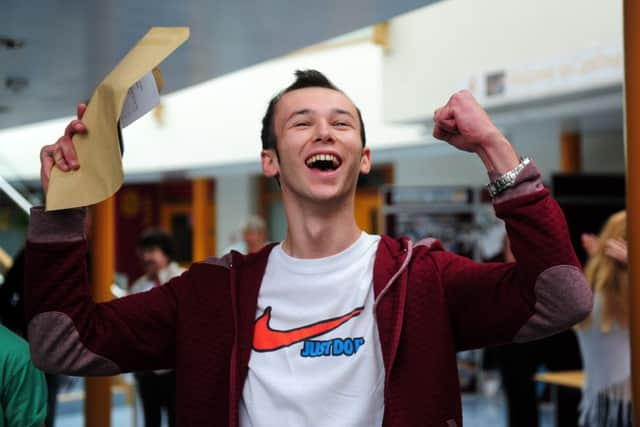Video: Number of ‘good’ GCSE grades is up but fears remain over turbulent results


Just over two thirds (68.8 per cent) of entries scored A*-C, up 0.7 percentage points on last summer, according to statistics published by the Joint Council for Qualifications (JCQ).
But the overall A*-G pass rate has fallen for the second year running, and is down 0.3 percentage points to 98.5 per cent from 98.8 per cent in 2013.
Advertisement
Hide AdAdvertisement
Hide AdThe proportion of entries awarded the highest grade has also fallen slightly, with 6.7 per cent gaining an A*, down from 6.8 per cent last year.


It is the third year in a row that this has dropped.
The rise in A*-C grades is the first increase in three years, and comes despite massive differences in this year’s English and maths results, both of which are considered key subjects.
In total, 61.7 per cent of English entries scored a C or higher this year, down 1.9 percentage points from last summer.
This is believed to be the biggest drop in the qualification’s history.
Advertisement
Hide AdAdvertisement
Hide AdMaths saw an opposite result, with 62.4 per cent of entries gaining an A*-C grade, up a massive 4.8 percentage points on 2013.
Exam chiefs suggested that there were several reasons for the hike in maths results, including a decision that in England, only a teenager’s first attempt at an exam would count in school league tables.
This may have meant that fewer lower-performing 15-year-olds are taking maths GCSE early, and bright students, who may have taken the qualification early in the past, are now sitting it in the summer, JCQ said.
In recent years there had been a growing trend towards schools entering pupils for exams early, or multiple times, but the new rule has changed this, and figures published earlier this year showed around a 40% drop in early entry across all subjects.
Advertisement
Hide AdAdvertisement
Hide AdJCQ also said that the fall in English grades could be down to strong candidates taking advantage of a final opportunity to sit the exam last winter, and a switch by students to take an International GCSE (IGCSE) in the subject.
Today’s results follows the exam regulator Ofqual warning there was likely to be”variability” in the results at a school level this summer because of the significant changes to the qualification.
A move to end-of-course exams, more students taking international GCSEs (IGCSE), cuts to re-sits, a toughening up of GCSE geography, and a decision by Government that only a pupil’s first attempt at a GCSE will count in school league tables are all likely to affect this year’s results, the regulator said.
The speaking and listening assessments in English also no longer count towards a student’s overall grade.
Advertisement
Hide AdAdvertisement
Hide AdExperts had predicted that some schools could experience sharp shocks as a result of this - particularly if they had relied on entering a pupil more than once for an exam.
However it was also suggested that the fact that fewer 15-year-olds were taking the exam early this summer could result in improved grades overall as the cohort is older than in previous years - and this appears to be the case.
However last night initial reaction from teachers on social media suggested that there could also be widespread disappointment.
Brian Lightman, general secretary of the Association of School and College Leaders (ASCL) said: “We are getting some individual reports of volatility, but we don’t know about overall trends yet.
Advertisement
Hide AdAdvertisement
Hide Ad“Some schools have seen surprises. Some schools have seen results which are lower than expected.”
Jonny Mitchell, the head teacher of Thornhill Community Academy - made famous by the Educating Yorkshire TV series - said on Twitter last night that there had been “some shocking stories emerging from schools about way-below outcomes against predictions.” There was also concern being voiced by teachers about the grade boundaries being used by exam boards in both English and maths at GCSE this year.
Prof Smithers, director of the Centre for Education and Employment at Buckingham University, said: “Individual schools are likely to be affected differently according to how much they relied on gaming the old system, so for some there could be sharp shocks in store.” Benchmarks set by the Government on the proportions of pupils in each school gaining at least five C grades, including English and maths, have been very important to schools, Prof Smithers said.
“Schools devised all sorts of ways to help the students that might otherwise struggle to meet at least a C grade,” he suggested.
Advertisement
Hide AdAdvertisement
Hide AdThis included putting pupils in for exams early to give them practice and allow teachers to identify where pupils were falling short.
As GCSE results are announced a new campaign backed by the Government and employers has been launched to encourage young people to take up apprenticeships.
The initiative will highlight the variety and quality of the training schemes on offer - including 40 new employer designed apprenticeships including engineering, hospitality and law - the Department for Business, Innovation and Skills (BIS) said.